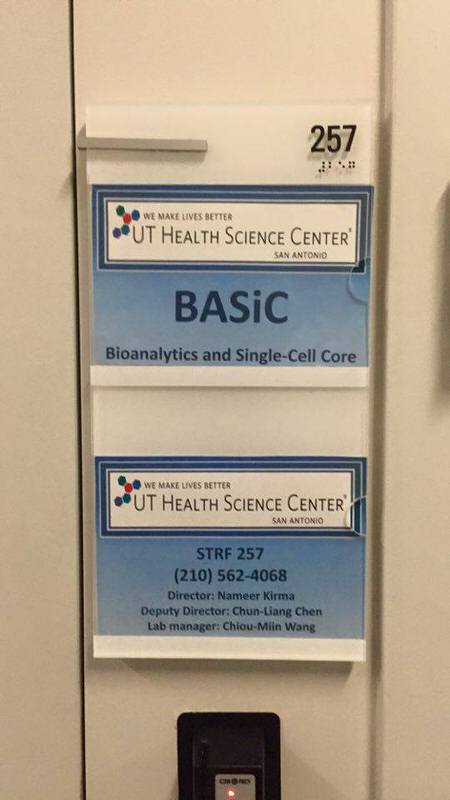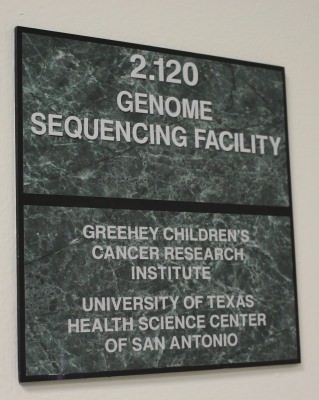Two New Research Core Laboratories
Two new cores— the Bioanalytics and Single Cell (BASiC) Core and the Bioinformatics and the Computational Genomics (BCG) Core have been added at UT Health Science Center San Antonio.
New Core Facilities
Bioanalytics and Single Cell (BASiC) Core
 Following the departure of the core director, Dr. Douglas Williamson, the Research Core Laboratories (RCL) formerly known as the Core for Advanced Translational Technologies (CATT) has undergone a significant reorganization to focus on characterizing the molecular and biophysical attributes of single cells.
Following the departure of the core director, Dr. Douglas Williamson, the Research Core Laboratories (RCL) formerly known as the Core for Advanced Translational Technologies (CATT) has undergone a significant reorganization to focus on characterizing the molecular and biophysical attributes of single cells.
The funds to reorganize this new RCL, called the Bioanalytics and Single Cell (BASiC) Core, were leveraged by a $3.3M core facility grant from the Cancer Prevention and Research Institute of Texas (CPRIT) awarded to Dr. Tim Huang, Professor and Chairman of the Department of Molecular Medicine to advance research, diagnosis and treatments of cancer at the single cell level. Dr. Huang, who also serves as Deputy Director of the Cancer Therapy and Research Center (CTRC), envisioned a core that could serve a broad range of research topics beyond cancer research.
To make this happen, Dr. Huang developed a plan for a core laboratory that would provide the same single-cell services for clinical samples from all types of projects.
In August, 2015, when Dr. Williamson announced that he had accepted a new position at Duke University, Dr. Huang stepped in to reorganize the remaining elements of the CATT core and merge it with the new capabilities for single cell analysis. The plan for the new BASiC Core was reviewed and endorsed by the UCRF at the end of the same month.
Dr. Nareer Kirma, Associate Professor Research, in the Department of Molecular Medicine, will serve as the new director of the reorganized core. The core is retaining the services of Lab Manager Dr. Chiou-Miin Wang and Dr. Nicholas Lucio, so they can continue to deliver many of the services that were offered by the CATT. The technologies that will remain at the BASiC include pyrosequencing (for methylation analysis), Luminex biomarker panels, and Fluidigm’s nanofluidic PCR.
New technologies for single cell analysis include immunofluorescence micromanipulators, Silicon Biosystem’s DEP Array cell sorting, and atomic force microscopy. Additional services are in the planning and development stages.
For more information or to request services, visit the BASiC core’s iLab website here, or contact Dr. Nameer Kirma (kirma@uthscsa.edu).
Bioinformatics and Computational Genomics (BCG) Core
 As biomedical research becomes increasingly dependent on advanced bioinformatics, many UTHSCSA faculty have asked for services to help analyze the massive data produced by the latest technology platforms.
As biomedical research becomes increasingly dependent on advanced bioinformatics, many UTHSCSA faculty have asked for services to help analyze the massive data produced by the latest technology platforms.
As a first step toward providing a solution, the VPR Office is investing discretionary funds into forming a new bioinformatics service center, called the Bioinformatics and Computational Genomics (BCG) Core. The new BCG will provide access to skilled personnel who perform service-oriented data analytics and consulting for next-generation-sequencing (NGS) projects.
NGS is one of the most popular technologies that produces genome-scale sequencing data of DNA and RNA-derived samples. The Illumina HiSeq 2500, for example, which is operated by the Genome Sequencing Facility at the Greehey Children’s Cancer Research Institute (GCCRI), can produce 120 GB of raw data per day.
Dr. Yidong Chen, Professor in the Department of Epidemiology and Biostatistics and the GCCRI has agreed to serve as the faculty advisor for the BCG.
Dr. Chen’s first order of business is to recruit a core director with extensive expertise in bioinformatics who will manage the daily operations of the facility. The initial step of the implementation plan includes employing two additional full-time programmers or data analysts.
This initiative will address the immediate needs of researchers at UTHSCSA while building toward longer-term goals for growing local bioinformatic expertise and educational opportunities.
Contact Dr. Yidong Chen (chenY8@uthscsa.edu) for more information about this new core.
More Information About Cores
The institutional Research Core Laboratories (RCL) fulfill a
vital function for the scientific mission of the Health Science Center (HSC) as
they provide state-of-the-art equipment, technical expertise and services that
are often out of the individual investigator’s reach. All RCL are subsidized
with institutional funding through the Office of the Vice President for
Research (VPR) and are operated by accomplished faculty and highly skilled
staff.
In addition to the annual subsidy from the institution, which
typically covers a portion of the cores’ salary expenses, the RCL recover part
of their direct operating costs from usage fees. As designated cores for the
NCI Cancer Center Support Grant, most RCL receive funding from the Cancer
Therapy and Research Center (CTRC). In recent years the Institute for Integration of Medicine and Science (IIMS) has covered a portion of the cores’
salary expenses through its Clinical and Translational Science Award (CTSA).
Each year all RCL are reviewed by the University Core Research
Facility (UCRF) Committee. The UCRF helps set policies and provides
recommendations on budget priorities and management issues that face each core.
The UCRF also reviews new core initiatives and helps set the strategic
direction for the cores.
The VPR Office is
currently seeking faculty members to serve on the UCRF Committee and department
chairs are invited to submit nominations. Faculty currently serving on the UCRF
Committee include Drs. Randolph Glickman (Chair), Karen Block, Yong-Hee Chun,
Lily Dong, Paul Fitzpatrick, Maria Gaczynska, Stephen Harris, Ellen Kraig, and
Rajeshwar Tekmal.
